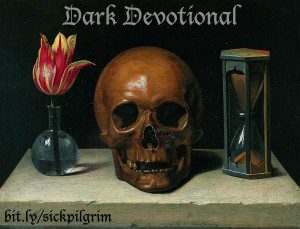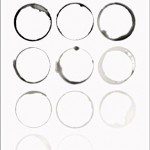
“The stage is set. The curtain rises. We are ready to begin.”
Benedict Cumberbatch probably wasn’t thinking of Christianity when he recited those lines, yet his words are fitting on this first night of the Triduum. This was the night of the first Mass, the beautiful origin of washing your contemporaries’ feet, the great betrayal of Jesus by one of his own. Holy Thursday. The following days would bring the greatest hardships to both Jesus and his followers and would, eventually, lead to a great salvific victory for all of humanity.
Shit was about to get real.
After the first Mass (when the apostles were probably relieved to find that Jesus wasn’t asking them to be cannibals, despite all the confusion in John 6:52), when Jesus obliterated societal norms by washing his homies’ feet, Jesus faced his greatest existential crisis: feeling abandoned by God, yet intellectually assured in his theology. The old self-doubt versus confidence .
Hello darkness, my old friend.
After withdrawing about a stone’s throw from them [his disciples] and kneeling, he prayed, saying, “Father, if you are willing, take this cup away from me; still, not my will but yours be done.” (Luke 22:41-42)
This glimpse into the vulnerability of Jesus strikes me. In my young faith, God was the kingly opposite of me: always secure in his limitless confidence. He was strong and I was weak; he was joy and I was ennui; he was everything I wasn’t.
In other words, I felt I sucked. Believing in an absolute champion made life more bearable.
In a large part, I disliked myself because of my physical condition, which depleted my coordination in my teenage years. In fifth grade, I played every sport; I used a wheelchair full-time in college.
And you think puberty was rough for you.
As my dexterity diminished during my already awkward voice-cracking years, I despaired. In my immature vision, the cold, cruel world was drowning my strange, sad self. Incubus gave intense if not melodramatic voice to my mute soul.
I dig my toes into the sand
The ocean looks like a thousand diamonds
Strewn across a blue blanket
I lean against the windPretend that I am weightless
And in this moment I am happy, happy
Being so unsatisfied with myself, and willing to accept the presence and comfort of the supernatural, I defined God in my terms: an escape from life’s frustration, unlike me in every way. I was a mess; God is perfect. Period. A divine escape.
This simple understanding of God buoyed me as I transferred from high school to college and from walking to using a wheelchair. And, hell, it served its purpose. My angst at myself only made me a holier Christian boy.
An easy way to hate your life in an acceptable way is to believe in a God who only exists as everything you are not.
Like a shiny cross-shaped balloon, my faith seemed impressive to everyone, even me, though it was almost entirely my own hot air. The inevitable needle came from a wandering minister I met at a free lunch hosted by the campus Catholic church every week. Since he seemed out of place and was sitting alone, I happily rolled up to him. When this new Protestant speaker from out of town asked me about my faith, I obliged with my story of going from a elementary athlete to president of my college Catholic student center, now sitting in a wheelchair. I went through most of my spiritual vulnerabilities with him – feeling embittered, excluded from God’s love, and inexplicably alone; the time I was prayed over by a faith healer (That was a hell of a time.); and more.
He listened intently with a look of understanding and piety. After I finished speaking, he took a deep breath and looked away. I expected some words of encouragement from this newfound minister-friend.
“Well, I know one thing,” he said willfully, after his long dramatic pause. “If I were in your situation, Jesus wouldn’t let me be in a wheelchair.”
…
What the hell?
His stark reply left my head spinning. With an abrupt but not impolite excuse, I left my recent minister-friend and the building, to be alone and to process.
The clouds of self-doubt began to gather in my mind. To believe in a healing God and still be sitting in a wheelchair was a painful paradox, one I didn’t like to think about much.
The fledgling pastor’s words, I reflected, were the extreme but appropriate climax of a simple theology – not to say a Protestant one, because as a Catholic I can attest that this fickle belief pervades across denominations. If the strong are “with God,” then the weak must be far from him. This belief is a welcome escape for the insecure, but doesn’t compute for the confident. So God is either (a) an esoteric comfort just beyond our human reach or (b) the fuel that empowers pretty people who quote “I can do all things through Christ who strengthens me,” out of the Bible and out of context; God is either hope for the weak or endurance for the strong. To say he is both is simplistic. And damn inconsistent.
For a believer in God to willingly face suffering, even the not-so-bad limitation of being confined to a wheelchair, seemed abhorrent to the minister. Yet, as I learned kicking and screaming, sometimes accepting hardship is necessary, even though it sucks.
It seems Jesus knew this better than I do. He prayed, “Father, if you are willing, take this cup away from me; still, not my will but yours be done.” Not “Father, it’s me, so don’t allow me to suffer.” That vagabond pastor, my scapegoat for my own simplistic theology, prayed to God, “Still, not your will, but mine be done.”
This Easter, my hope is that we experience the days leading up to it less as a great display of power, and more as an awful situation that Jesus found himself in. And I hope we realize in our darkest moments, when we’ve been spit on and abandoned and when we see death fast approaching, we have the stubbornness to hang on just a while longer. Maybe that stubbornness can even be called courage.
So in preparation for the holiest day of the year, the remembrance of Jesus giving the middle finger to death, may we experience in both a holy and wholly way the darkness and pitfalls of our lives.
Or whatever that means. Coming down from a religious presumption, may we learn all we can from the shitty moments we face, instead of hurriedly brushing them off. May we endure no matter what.
Because Easter is coming.
Keep your heads up. The game, my friends, is on.
https://www.youtube.com/watch?v=rXx6sk6YqZ0
Matthew Lafleur is trudging through life in a variety of ways: dark and giddy, serious and funny, meaningful and preposterous. So he’s at home in the Catholic Church. His existential wandering got serious when he submitted to full-time wheelchair use at age 18 because of Friedreich’s ataxia, which you can read about here. He has a bachelor’s in English literature and a master’s in mental health counseling. You can find him brooding and musing on Facebook and Twitter. He’s a regular contributor to Sick Pilgrim.











